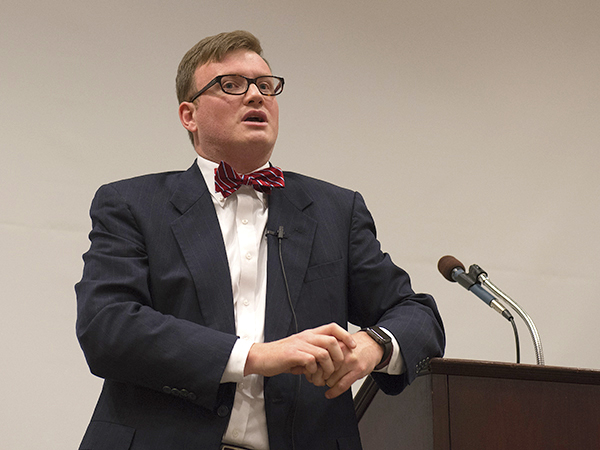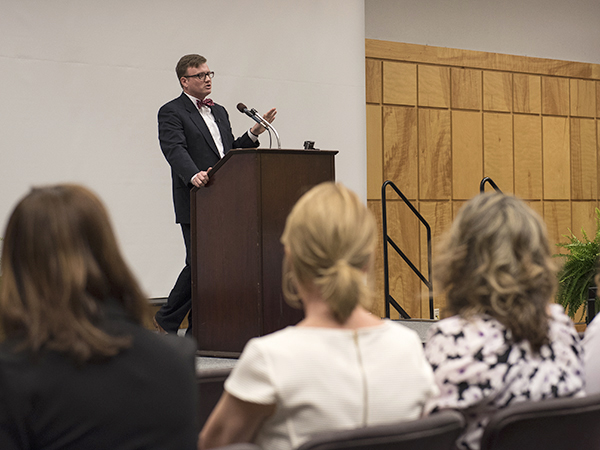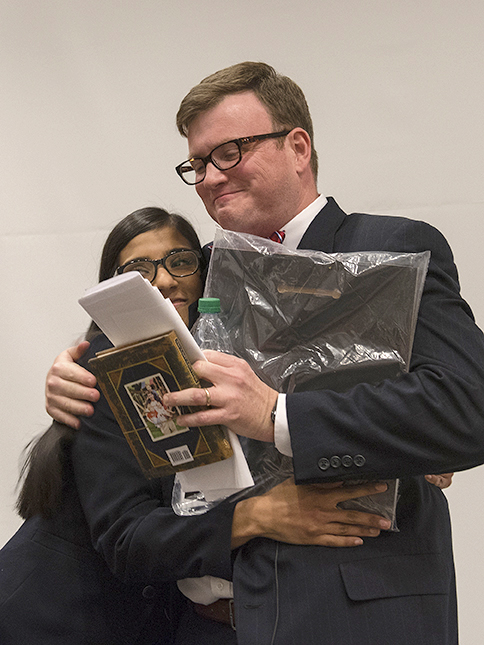Ingram shares life lessons during Last Lecture

Dr. Brad Ingram has already made an impression on students, medical and beyond, which is why he was chosen to give the second annual Last Lecture on Wednesday in the Student Union to a crowd of almost 250 students, faculty, and staff. He shared a serious message about physician and health care burnout, but delivered his thoughts on the subject with plenty of laughs.
Hosted by Student Alumni Representatives, or STARs, the Office of Alumni Affairs, and the Associated Student Body, a “Last Lecture” is traditionally a message that someone gives knowing it's their last chance to speak publicly, an idea that became popularized when Dr. Randy Pausch gave a talk at Carnegie Mellon University one month after learning he had metastatic pancreatic cancer in 2007. At only 38 years old, Ingram said he was extremely humbled to be chosen, and joked that this is his “mid-life crisis” lecture instead of his last.
Ingram is an assistant professor of pediatrics in the Division of Pediatric Neurology at the University of Mississippi Medical Center. He was diagnosed with epilepsy at the age of 16. While in college, he met a doctor in Memphis who finally diagnosed his specific epilepsy and told him there was no reason his disease should ever keep him from medical school, or anything else he wanted to do.
His personal experience with the disease has made him who is as a doctor today. “I'm really passionate in taking care of kids. I want them to know, 'you have epilepsy; don't let it have you,'” he said.

As passionate as he is about treating his patients, he's equally as passionate about working with students.
When the STARs Last Lecture committee was discussing nominations, medical student Maribeth Hillhouse, of Madison, said Ingram's personal relationship with students made him stand out among the other candidates.
“He goes the extra step and makes the extra effort when students are struggling, which is something not always typical of doctors,” said Hillhouse. “He makes all students feel important.”
“It's very humbling, not just giving this Last Lecture, but any time I get to teach or give a lecture,” said Ingram. “I hope [that me being chosen] has little to do with me as a doctor and more to do with me as a person.”
For his half-hour lecture, Ingram shared the lessons he's learned so far that have helped him be a better doctor. First and foremost, his message was about finding your purpose versus your passion, and that your entire purpose should not be work.
“The older I get, the more I realize that who I am is outside of work,” he told students.
If you focus too much on who you are as a nurse, doctor, pharmacist, etc, then you lose who you are and why you chose your field in the first place, he told the group.
“When you're not being fulfilled or getting certain needs met, you go to your base level, and that's not a good place to operate from,” he said.

Some of his other lessons included, “develop coping mechanisms now,” “pour into yourself so you can pour into your patients,” and, most importantly, “be selective about who you spend your time with outside of work.”
One of his main points was that by finding who you are outside of work, you will come to work as your best self, which is what patients need.
“I have to be my best outside of work to be my best at work,” he said. “When I'm at work, it's not about me. We deal in pain, sadness, and trauma. It's often somebody's worst day, it doesn't get to be your worst day, too.”
Ingram also stressed that it needs to be OK to recognize that you're having a hard time, and that it's OK to ask for help.
“I think it's awesome to hear this now as a medical student, instead of 30 years down the road,” said Hillhouse. “Kids dream of medical school and all they think it will be, and then there's this burnout, in part because it can be so draining. Addressing this early is crucial to finding a balance of life and work, so that those in health care are able to pour into their patients without being detrimental to their own well-being. ”
Ingram's perhaps loudest and clearest advice during the lecture was, “This place [UMMC or wherever you work] is not where you'll find your 'you.' You should be the best at what you do and keep your passion about it, but don't make work your entire purpose in life.”


